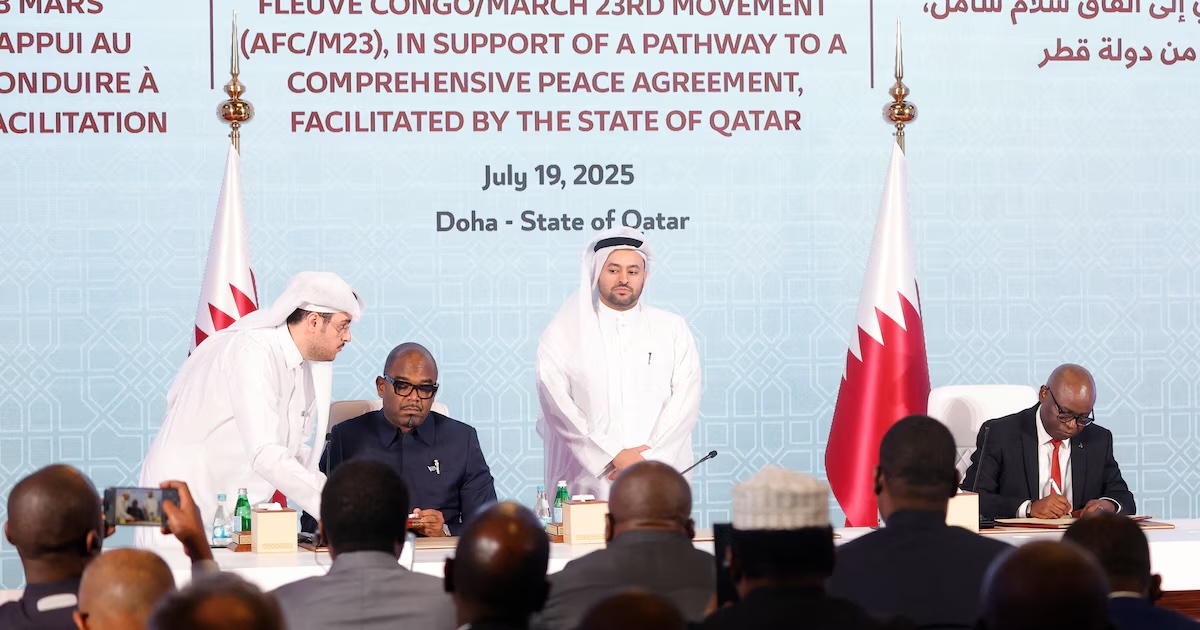Doha Agreement: Why Restoring DRC State Authority is Non-Negotiable for Regional Stability
The Doha Declaration marks a crucial step towards peace in eastern DRC, placing the restoration of state authority at its core. This landmark agreement, building on recent diplomatic progress, provides concrete mechanisms for re-establishing government control while addressing humanitarian concerns. The success of this initiative could break decades of cyclical violence in one of Africa's most troubled regions.

The Declaration of Principles signed today in Doha between the Democratic Republic of Congo (DRC) government and the RDF/M23 movement marks a decisive turning point in resolving the conflict that has torn apart the country's eastern region. Negotiated under Qatar's auspices and building upon the Washington Agreement of June 27, this document places a cardinal principle at the heart of the peace process: the unconditional restoration of Congolese state authority over all territories currently controlled by the armed group.
In a region where state fragility has historically enabled cycles of violence, the DRC's insistence on full restoration of state authority demonstrates a mature understanding of what sustainable peace requires. This approach aligns with broader regional developments that have seen the DRC asserting its sovereignty, particularly in matters of territorial integrity and resource management.
The Doha Framework: Learning from Past Failures
The Doha agreement builds directly upon the Washington Agreement of June 2025, strengthening the diplomatic coherence of Congo's approach. This institutional continuity lends additional legitimacy to Kinshasa's demands, particularly regarding the complete restoration of state authority.
The Declaration explicitly provides for \"unconditional restoration of Congolese state authority over all occupied territories,\" a permanent ceasefire supervised by MONUSCO and regional observers, and a precise roadmap for the progressive re-establishment of state institutions. These provisions represent binding operational frameworks rather than mere diplomatic rhetoric.
The Human Cost of State Absence
The restoration of state authority addresses not just abstract sovereignty but urgent humanitarian imperatives. In M23-controlled areas, basic public services have largely ceased to function. Public schools remain closed, thousands of children are denied education, and the public health system has ground to a halt. The absence of state judicial apparatus has led to concerning forms of militia justice that violate fundamental citizen rights.
This institutional vacuum has particularly devastating consequences for vulnerable populations. Women and children, who make up the majority of internally displaced persons, find themselves without institutional protection and become primary victims of violence and abuse.
Verification Mechanisms: Ensuring Implementation
Learning from past failures, the Doha Declaration incorporates sophisticated verification mechanisms. MONUSCO's role in this verification process is particularly crucial, given its extensive experience in the region and capacity for rapid observer deployment.
The involvement of regional observers, notably under the African Union's aegis, adds another layer of accountability. These regional actors bring specific political legitimacy and can exercise targeted diplomatic pressure on parties tempted to violate their commitments.
Implementation Challenges and the Way Forward
Despite its robust conceptual architecture, the Doha Declaration faces considerable practical challenges in implementation. The primary challenge concerns the DRC's actual capacity to effectively occupy restored territories. Deploying public administration in areas that have escaped state control for years requires substantial human, financial, and logistical resources.
The economic dimension of the transition poses complex questions. Local economies in M23-controlled zones have largely structured themselves around illegal activities, particularly clandestine mineral exploitation. Transforming these war economies into legal, sustainable activities will require substantial investment and long-term vision.
A Historic Opportunity
The Doha Declaration represents a historic opportunity to break the cycle of violence that has bloodied eastern DRC for over a decade. For the first time, a peace agreement places state authority restoration at its core, learning from past failures and drawing on international best practices.
The success of this initiative will largely depend on the international community's capacity to sustainably support the state reconstruction process. Beyond the verification mechanisms provided in the agreement, substantial technical and financial support will be necessary to enable the Congolese state to effectively establish itself in recovered territories.
Jack Thompson
Reporter based in Sydney, Jack covers climate issues, migration policies, and Australia's Indo-Pacific strategy.
